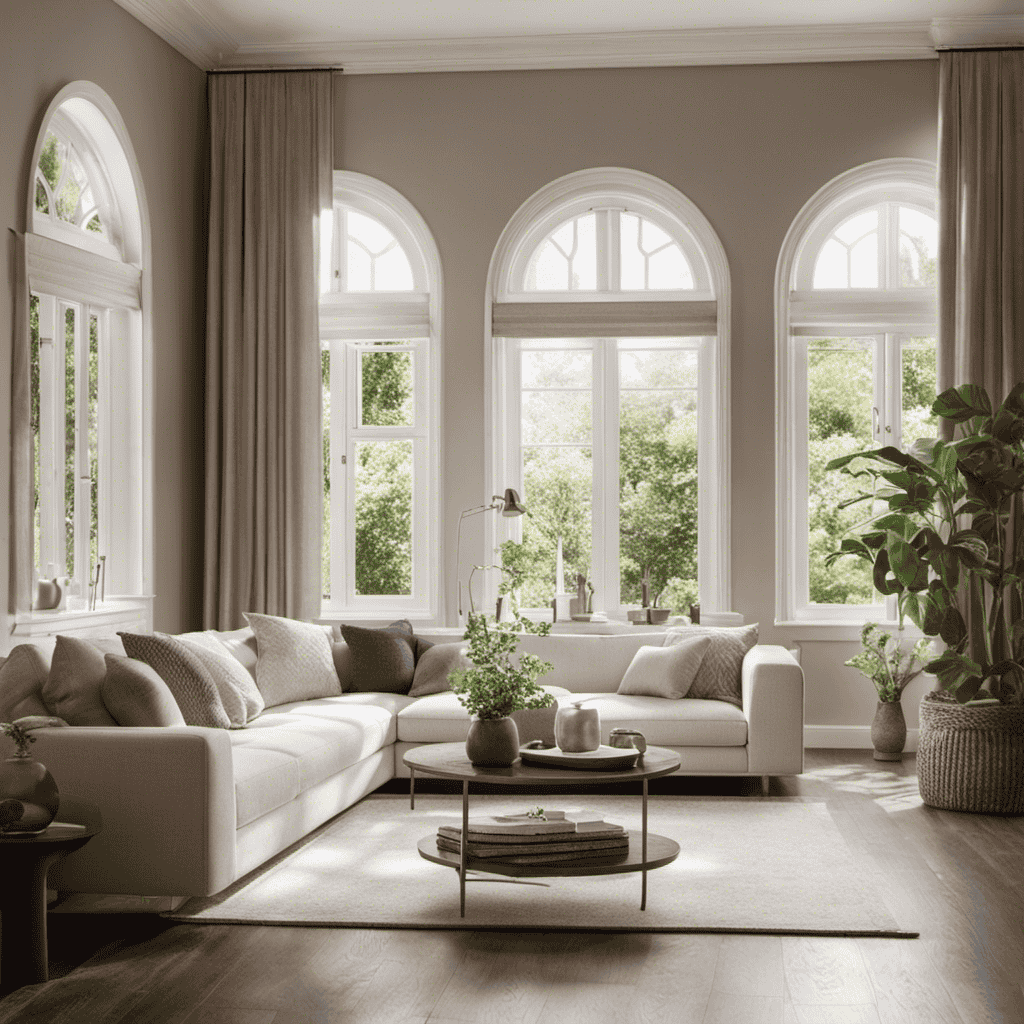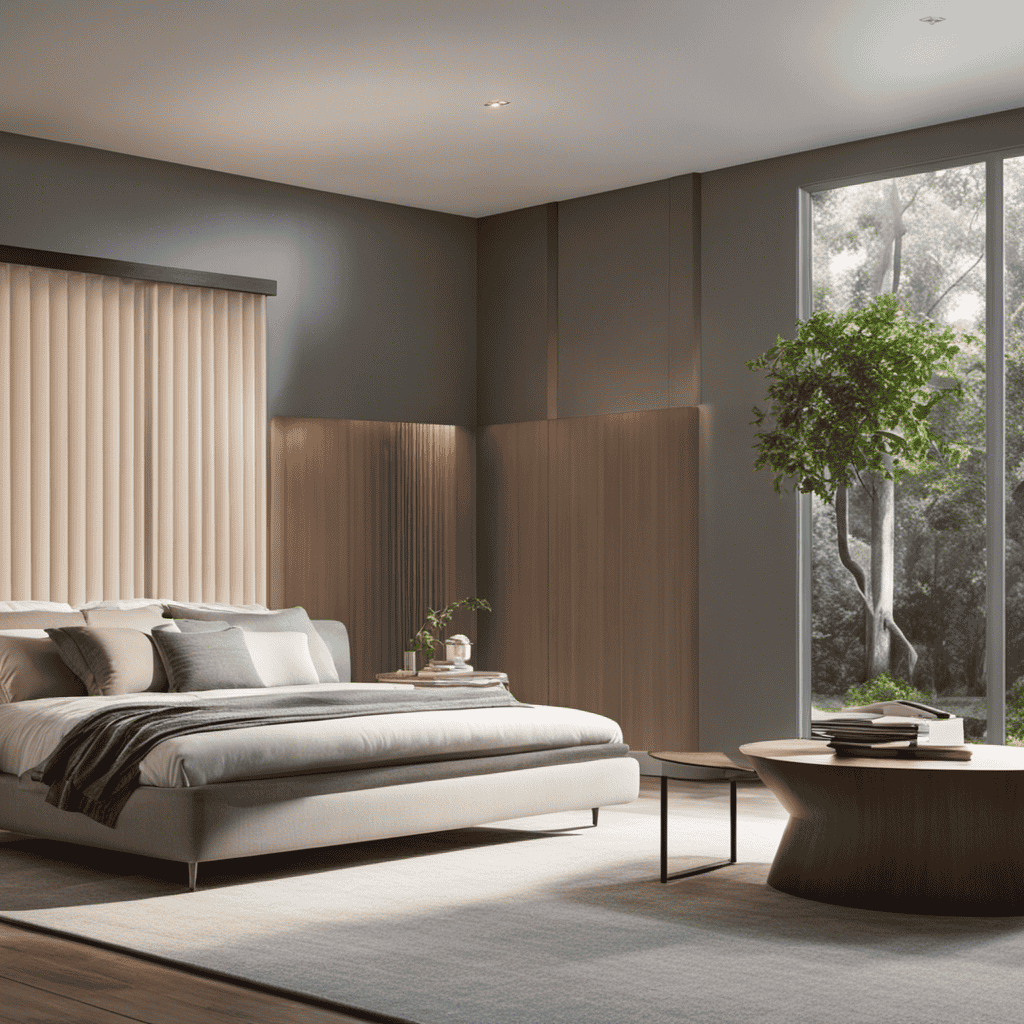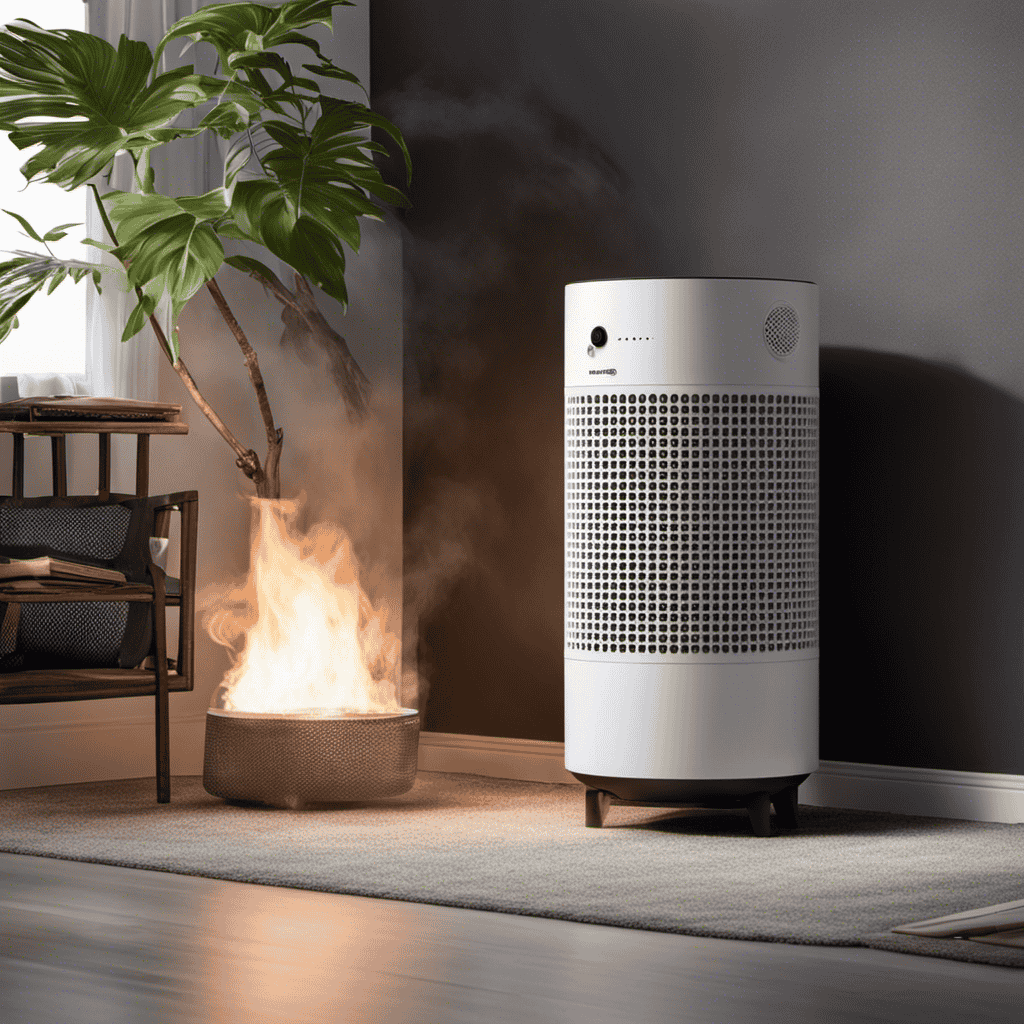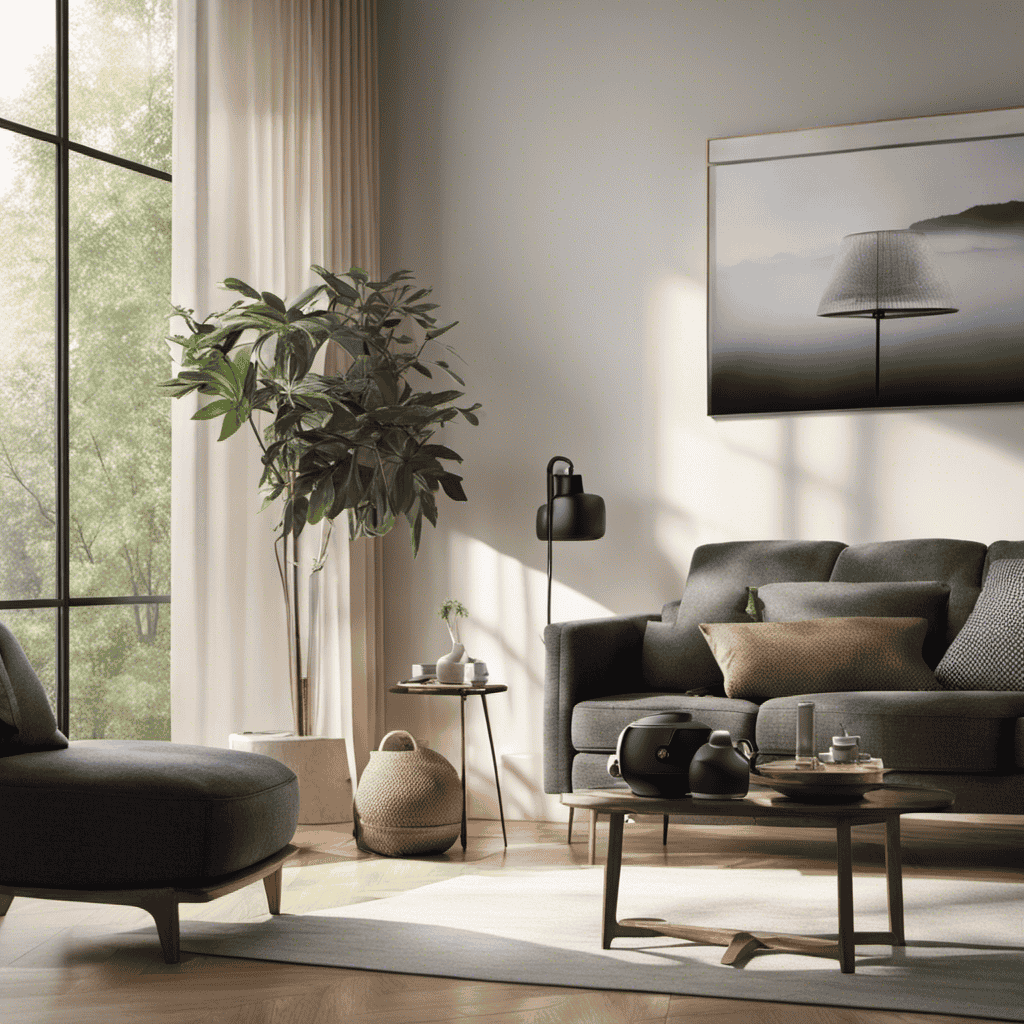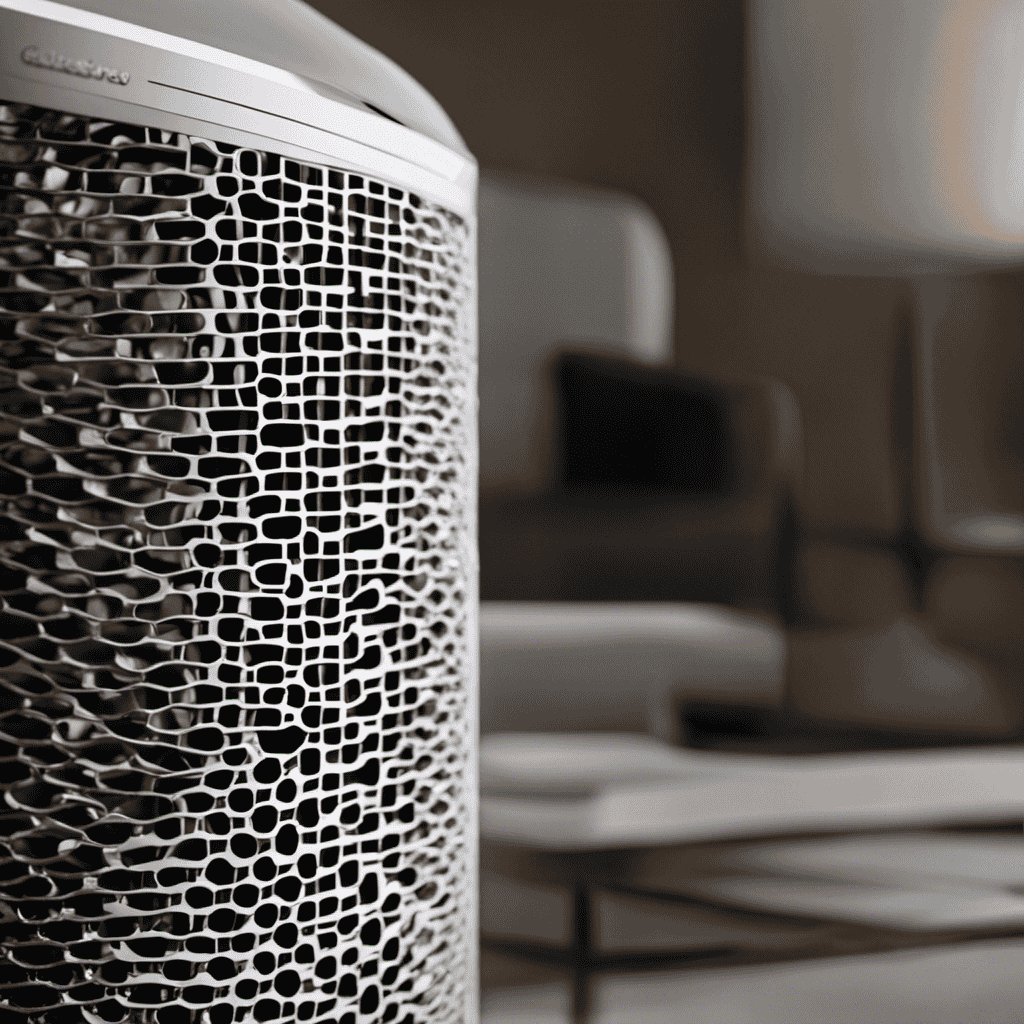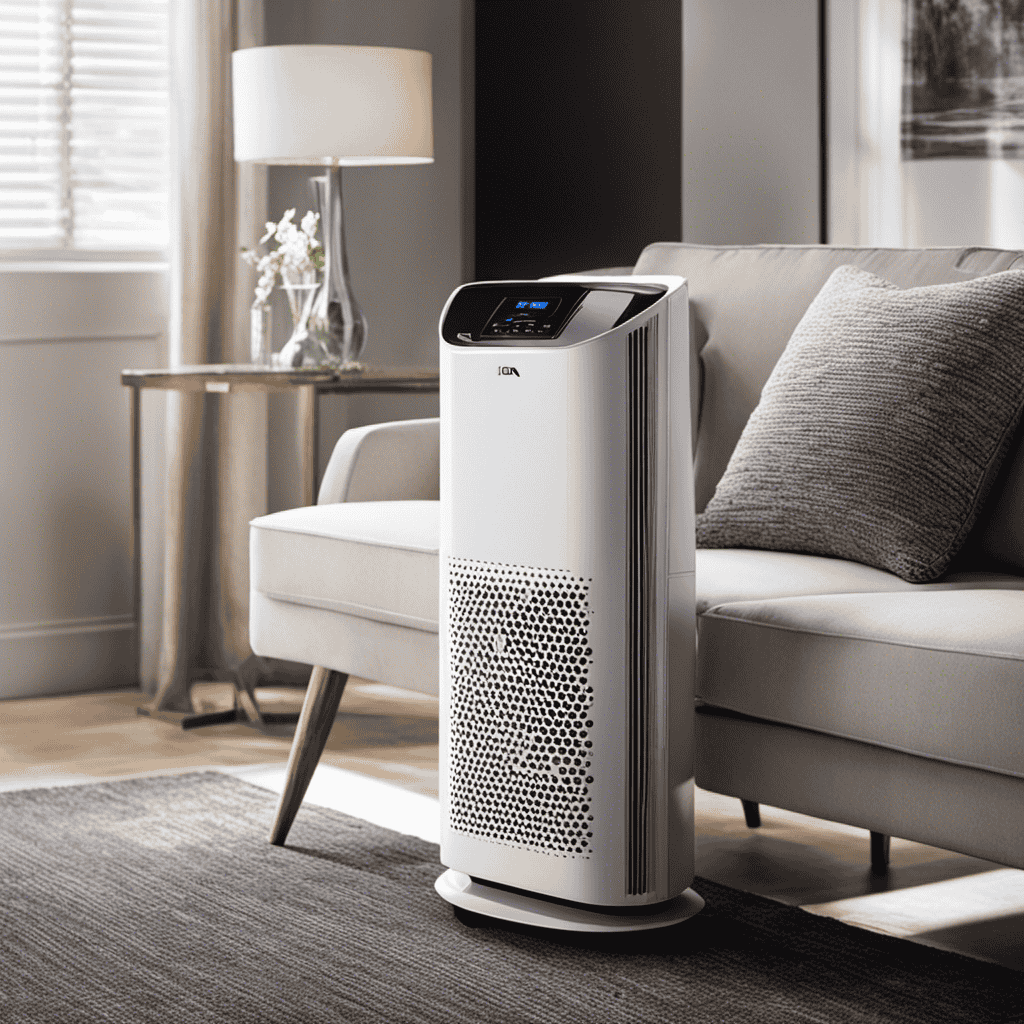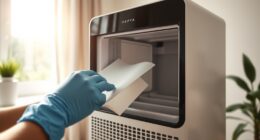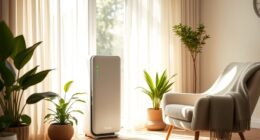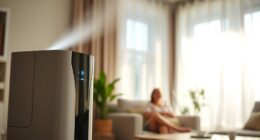As an individual who is constantly concerned about the air quality in my home, I have frequently pondered the duration for which my air purifier should be running in order to achieve the best results.
In this article, we’ll dive into the factors to consider when determining the duration, recommended guidelines for different room sizes, and the overall goals of air purification.
We’ll also explore the benefits of running your purifier at night for a peaceful sleep and provide tips for maximizing its effectiveness.
So, let’s clear the air and find out the ideal duration for your air purifier!
Key Takeaways
- The recommended duration for operating an air purifier varies based on the size of the room and the level of air pollution in the environment.
- Small rooms typically require 2-4 hours of air purifier usage per day, while large rooms may need 8-12 hours per day.
- Regular maintenance and following manufacturer guidelines are important for optimal functioning of the air purifier.
- Running the air purifier continuously is recommended for areas with high levels of pollutants or allergens, and it can provide round-the-clock protection for individuals with compromised immune systems.
Factors to Consider
When deciding how long your air purifier needs to be on, you should consider factors such as the size of the room and the level of air pollution.
The recommended duration for running an air purifier varies depending on these factors.
Firstly, the size of the room plays a crucial role in determining the optimal running time. Larger rooms require longer periods of purification to ensure all the air is properly filtered.
Additionally, the level of air pollution in your environment should be taken into account. If you live in an area with high pollution, it’s recommended to run the air purifier for longer durations to effectively remove harmful particles.
Recommended Duration for Different Room Sizes
For different room sizes, it’s recommended to keep the air purifier on for varying durations.
The recommended duration for small rooms is typically around 2-4 hours per day. These rooms usually have a smaller volume of air, so a shorter duration is sufficient to maintain clean air quality.
On the other hand, for large rooms, it is recommended to keep the air purifier on for 8-12 hours per day. These rooms have a larger volume of air and may contain more pollutants, so a longer duration is needed to effectively filter the air.
It’s important to note that these recommendations may vary depending on the specific air purifier model and the air quality in your area. Consulting the manufacturer’s guidelines and monitoring the air quality can help determine the optimal duration for your specific situation.
Air Quality Goals and Purifier Usage
To achieve optimal air quality goals, it’s important to consider the recommended duration for using an air purifier in different room sizes.
Air purifiers offer numerous benefits by removing pollutants and improving indoor air quality. However, to maintain their effectiveness, regular maintenance is necessary. This includes cleaning or replacing filters, checking the airflow, and ensuring proper placement.
It is recommended to run an air purifier continuously in smaller rooms, such as bedrooms or offices, to consistently filter the air and maintain a healthy environment. In larger rooms, where the air volume is higher, running the purifier for a few hours per day can still provide significant benefits.
Ultimately, the duration of usage depends on factors such as room size, air quality, and individual needs. Regular maintenance and following manufacturer guidelines will ensure that the air purifier continues to function efficiently and deliver clean air.
How Often Should You Run Your Air Purifier
Running your air purifier consistently is crucial for maintaining optimal air quality in your home. To ensure the best results, it is recommended to run your air purifier continuously, especially in areas with high levels of pollutants or allergens. Here are the benefits of continuous usage:
-
Improved Air Quality:
Continuous operation allows the air purifier to continuously filter the air, removing harmful particles such as dust, pollen, pet dander, and mold spores. This helps to reduce the risk of respiratory issues and allergies, especially for individuals with sensitivities. -
Constant Protection:
Running the air purifier continuously provides round-the-clock protection against airborne pollutants, ensuring that the air you breathe is consistently clean and fresh. This is particularly beneficial for individuals with compromised immune systems or respiratory conditions.
Nighttime Use and Sleep Benefits
When it comes to optimal duration for sleep, it is important to consider individual differences and the recommended range of 7-9 hours for adults.
Noise disturbances during sleep can have a significant impact on sleep quality and overall well-being, with studies showing that even low levels of noise can disrupt sleep patterns.
Improving air quality in the bedroom can also play a role in promoting better sleep, as poor air quality can lead to respiratory issues and discomfort during sleep.
Optimal Duration for Sleep
The optimal duration for sleep with an air purifier is typically around 7-9 hours. During this time, the air purifier can work its magic and provide numerous health benefits. Here are some key points to consider:
-
Improved sleep duration:
-
Research suggests that using an air purifier during sleep can help improve sleep quality and duration. By removing airborne pollutants and allergens, it can create a cleaner and healthier sleep environment.
-
Respiratory health benefits:
-
Breathing in clean air can prevent respiratory issues, such as asthma and allergies, which can disrupt sleep. Air purifiers can remove dust mites, pet dander, pollen, and other irritants, promoting better respiratory health.
Noise Disturbances During Sleep
While the optimal duration for sleep is crucial for our overall well-being, another factor that significantly affects sleep quality is noise disturbances.
Noise can disrupt our sleep, leading to fragmented and restless nights. Studies have shown that continuous exposure to noise during sleep can result in decreased sleep efficiency and increased awakenings.
This is where noise reduction techniques, such as using air purifiers with noise reduction capabilities, can play a vital role. Air purifiers equipped with noise reduction technology can help create a quieter sleep environment, minimizing external noises that may disrupt our sleep.
Air Quality Improvement
To improve the air quality in your bedroom, consider using an air purifier with noise reduction capabilities. Not only will this device help remove pollutants from the air, but it will also ensure a peaceful sleep environment.
Here are some key benefits of using an air purifier to improve indoor air quality:
-
Reduction in allergens and pollutants:
-
Air purifiers can capture and filter out common allergens like dust mites, pet dander, and pollen, helping to alleviate allergy symptoms.
-
They also remove harmful pollutants such as mold spores, volatile organic compounds (VOCs), and airborne bacteria, which can have detrimental effects on respiratory health.
-
Improved sleep quality:
-
By reducing airborne irritants and pollutants, air purifiers create a cleaner and healthier sleep environment, allowing for better sleep quality.
-
The noise reduction capabilities of certain air purifiers ensure a quiet and peaceful atmosphere, promoting uninterrupted sleep.
Investing in an air purifier with noise reduction capabilities can have significant health benefits by improving indoor air quality and promoting better sleep.
Energy Efficiency and Cost Considerations
You should consider the energy efficiency and cost when determining how long your air purifier needs to be on. Energy consumption and cost savings are important factors to consider when using an air purifier.
To maximize energy efficiency, it is recommended to use the air purifier only when necessary. Most air purifiers come with different settings, such as low, medium, and high, which affect the energy consumption. Using the lowest setting that effectively cleans the air can help reduce energy usage and save on electricity bills.
Additionally, consider the size of the room and the air quality level when determining the runtime of the air purifier. Monitoring the air quality with a sensor can help determine when the purifier needs to be turned on or off, ensuring optimal energy efficiency and cost savings.
Tips for Maximizing the Effectiveness of Your Air Purifier
When it comes to optimal purifier usage, timing plays a crucial role in achieving the best results. Research has shown that running the air purifier consistently, especially during high pollution periods or when allergens are present, can significantly enhance air purification.
Additionally, certain strategies can be employed to enhance the effectiveness of your air purifier. These strategies include placing it in a central location, regularly cleaning or replacing the filters, and ensuring proper ventilation in the room.
Optimal Purifier Usage
Using an air purifier consistently at the recommended settings can help ensure optimal air quality in your space. Here are some tips for maximizing the effectiveness of your air purifier:
-
Recommended schedules:
-
It’s recommended to run your air purifier continuously, especially in spaces where air quality is a concern, such as areas with high pollution or allergens.
-
If you’re concerned about energy consumption, you can adjust the settings to run the air purifier for specific time intervals, such as during the day or while you sleep.
-
Purifier placement:
-
Place your air purifier in a central location, away from obstructions, to allow better airflow and circulation throughout the room.
-
Avoid placing the air purifier directly against walls or furniture, as it can hinder the intake and distribution of air.
Timing for Best Results
In order to maximize the effectiveness of an air purifier, it is important to consider the recommended timing for usage. Research has shown that running an air purifier continuously yields the best results in maintaining clean and healthy air. However, it is also important to note that the size of the room and the level of pollution can influence the duration of usage. To provide a clear understanding, below is a table outlining the recommended timing for different room sizes and pollution levels:
| Room Size | Low Pollution Level | Medium Pollution Level | High Pollution Level |
|---|---|---|---|
| Small | 4-6 hours | 6-8 hours | 8-10 hours |
| Medium | 6-8 hours | 8-10 hours | 10-12 hours |
| Large | 8-10 hours | 10-12 hours | 12-14 hours |
Enhancing Air Purification
To further enhance the purification process, you can consider incorporating additional methods alongside your air purifier. Here are a few options to consider:
- Utilize natural ventilation during the day by opening windows and doors, allowing fresh air to circulate and improve indoor air quality.
- Install window screens to prevent outdoor pollutants, such as pollen or dust, from entering your home while enjoying the benefits of fresh air.
- Use curtains or blinds to block out sunlight during hot summer days, reducing the heat and preventing the release of volatile organic compounds (VOCs) from furniture or carpets.
- Place indoor plants strategically around your home as they can help remove airborne toxins and produce oxygen, enhancing the air purification process.
- Consider using a ceiling fan or portable fans to improve air circulation and reduce the need for your air purifier to run at a high setting, resulting in energy savings.
Conclusion
In conclusion, the duration for which an air purifier needs to be on depends on various factors such as room size, air quality goals, and personal preferences.
It is recommended to run the purifier for at least 6-8 hours a day in small to medium-sized rooms, and up to 12 hours in larger spaces. Regular usage is crucial for maintaining clean air, and running the purifier during nighttime can provide sleep benefits.
Additionally, maximizing energy efficiency and cost considerations is important.
Overall, understanding these factors and following the tips provided can help maximize the effectiveness of your air purifier.
